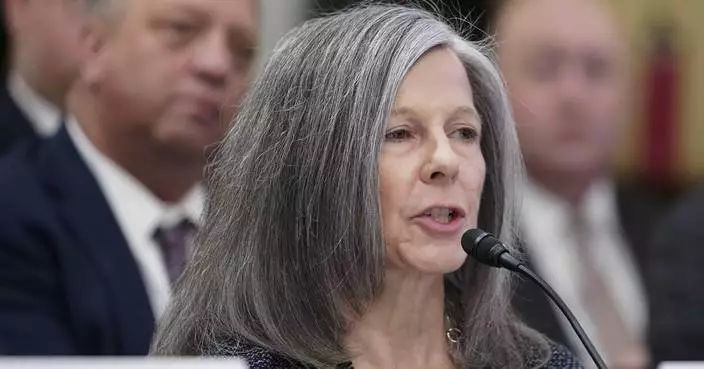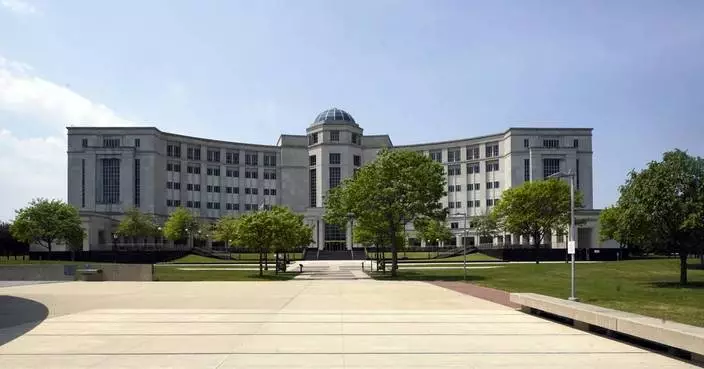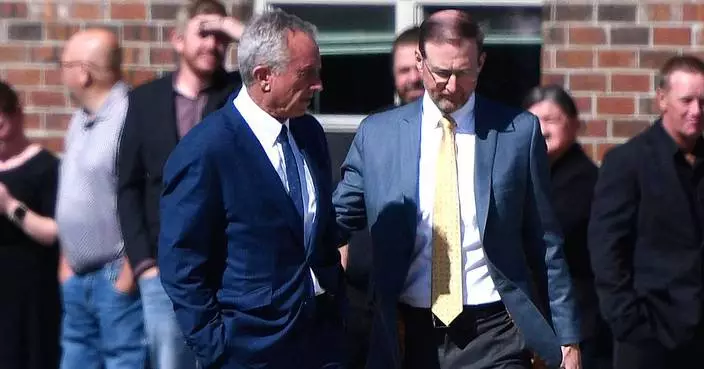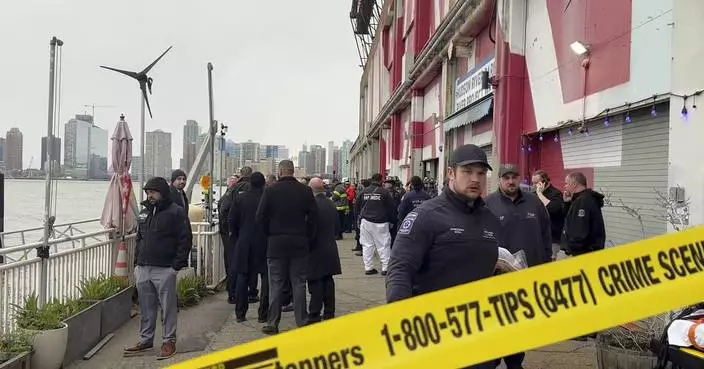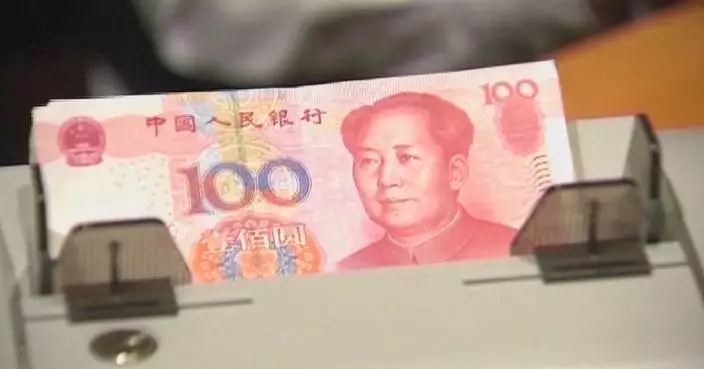A federal judge is allowing President Donald Trump’s administration to move forward with a requirement that everyone in the country illegally register with the federal government. The move will have far-reaching repercussions for immigrants across the country.
In a ruling Thursday, Judge Trevor Neil McFadden, sided with the administration, which had argued that they were simply enforcing an already existing requirement for everyone in the country who wasn’t an American citizen to register with the government.
The requirement goes into effect Friday.
Here's the latest:
A federal judge says she will halt the Trump administration from ending a program that allowed hundreds of thousands of Cubans, Haitians, Nicaraguans and Venezuelans to temporarily live in the U.S.
U.S. District Judge Indira Talwani said Thursday she will issue a stay on the program, which was set to end later this month. The push to help more than half a million Cubans, Haitians, Nicaraguans and Venezuelans is part of a broader legal effort to protect nationals from Ukraine, Afghanistan and other countries who are here legally.
Last month, the administration revoked legal protections for hundreds of thousands of Cubans, Haitians, Nicaraguans and Venezuelans, setting them up for potential deportation in 30 days. Homeland Security Secretary Kristi Noem said they will lose their legal status April 24.
▶ Read more about the judge’s decision
A federal judge is allowing the Trump administration to move forward with a requirement that everyone in the country illegally register with the federal government. The move could have far-reaching repercussions for immigrants across the country.
Judge Trevor Neil McFadden sided with the administration, which had argued that they were simply enforcing an already existing requirement for everyone in the country who wasn’t an American citizen to register with the government.
The requirement goes into effect Friday.
U.S. stocks surrendered a chunk of their historic gains from the day before as President Donald Trump’s trade war continues to threaten the economy.
The S&P 500 fell 3.5% on Thursday. The Dow Jones Industrial Average dropped 2.5%, and the Nasdaq composite sank 4.3%.
China announced more countermeasures against the United States, and losses for stocks accelerated after the White House clarified that it would tax Chinese imports at 145%, not the 125% rate Trump had earlier written about.
The swings also hit the bond market despite a better-than-expected report on inflation. U.S. crude oil prices fell more than 3%.
The U.S. on Thursday imposed economic sanctions on the owner of several firms that operate roughly 30 ships that transport Iranian oil illegally, as part of Iran’s “shadow fleet.”
United Arab Emirates-based Indian national Jugwinder Singh Brar and his two UAE and two India-based entities have been sanctioned.
The Treasury Department alleges that Brar’s ships transfer Iranian oil in waters off Iraq, Iran, the UAE and the Gulf of Oman.
“The Iranian regime relies on its network of unscrupulous shippers and brokers like Brar and his companies to enable its oil sales and finance its destabilizing activities,” Treasury Secretary Scott Bessent said.
“The European Union is a mafia,” Republican Rep. Derrick Van Orden said at a tele-town hall on Thursday. “They do protectionist policies with their individual industries, and then they hide it from the international community, including the United States, to give themselves a competitive trade advantage.”
Van Orden said he delivered that message to representatives from Estonia, France and Poland hours before the tariffs were paused on Wednesday.
“I was just telling those cats, ‘It’s over,’” Van Orden said.
When one constituent on the town hall asked about volatility in the stock market, Van Orden said once the trade agreements are reordered “it’s going to be a lot better.”
The White House has said that the grants violate an executive order banning diversity, equity and inclusion initiatives.
A lawsuit filed by groups representing teacher training programs had obtained a preliminary injunction against the cuts.
But in a different lawsuit, filed by Democratic attorneys general, the Supreme Court granted an emergency appeal from the government, allowing the administration to move forward with canceling the funding.
Plaintiffs in both cases have argued the grants are not DEI initiatives and ending them would hurt the pipeline of educators, especially in rural areas that struggle to retain teachers.
The Trump administration reversed its funding cutoff for a program that had sent 126 young Afghan women overseas for university despite a Taliban prohibition on women’s education, five days after terminating the program mid-school year without warning.
“Please disregard my previous email,” Thursday’s email from the U.S. Agency for International Development serving notice of the program’s reinstatement said. The email was viewed by The Associated Press.
Elon Musk associate Jeremy Lewin abruptly suspended hundreds of millions of dollars in contracts for some of USAID’s last remaining humanitarian work around the world over the weekend.
Lewin and the State Department reinstated some of the funding Tuesday after the AP reported on the cuts. U.S. funding for U.N. emergency food programs in Afghanistan and Yemen remains cut, however.
Lawmakers, the U.N. and aid organizations had pushed for restoration of the contracts.
The women’s education program, a project with Texas A & M University, is funded by interest payments from a $50 million 2019 endowment by USAID. Program managers say the project has no employees or office in Afghanistan.
Facing a deadline to turn over evidence for its attempted deportation of Columbia University activist Mahmoud Khalil, the federal government has instead submitted a brief memo, citing the Trump administration’s authority to expel noncitizens whose presence in the country damages U.S. foreign policy interests.
The two-page memo, which was obtained by The Associated Press and is signed by Secretary of State Marco Rubio, does not allege any criminal conduct by Khalil, a legal permanent U.S. resident and student who served as spokesperson for campus activists last year during large demonstrations against Israel’s treatment of Palestinians and the war in Gaza.
Rather, Rubio wrote, Khalil could be expelled for his beliefs.
Attorneys for Khalil said the memo proved the Trump administration was “targeting Mahmoud’s free speech rights about Palestine.”
▶ Read more about the government’s response and where Khalil’s case stands
Health Secretary Robert F. Kennedy Jr. said during a Cabinet meeting with Trump that he is undertaking a “massive testing and research effort” to determine the cause of autism.
Autism is a developmental disability caused by differences in the brain that presents with a wide range of symptoms that may include delays in language, learning, social and emotional skills.
Kennedy said Thursday that by September, “we will know” the cause of the developmental disability.
Scientists believe genetics and environmental factors can play a role, but the exact cause is unknown.
Anti-vaccine advocates, including Kennedy, have for years inaccurately claimed that routine childhood shots may cause autism.
The belief first gained traction decades ago after the publication of flawed studies that have since been retracted. Decades’ worth of subsequent studies have found no connection between vaccines and autism.
National intelligence director Tulsi Gabbard said at the Cabinet meeting that more than 100 people have been working “around the clock” to scan papers related to the 1960s killings of both leaders.
Gabbard told Trump that the papers have been “sitting in boxes in storage for decades” and “have never been scanned or seen before.” She said they’d be ready for release soon.
Kennedy’s son, Health Secretary Robert F. Kennedy Jr., who was also at the meeting, said he was “very grateful” when Trump asked how he left about the pending release.
Trump ordered the papers released when he took office again in January.
The departure of Bridget Brinks after nearly three years in Kyiv comes at a time of uncertainty over the Trump administration’s attempts to broker a peace deal to end the Russia-Ukraine war.
The State Department said on Thursday that Brink will be leaving her post, although it was not immediately clear exactly when she would depart.
Brink assumed the post under former President Joe Biden’s administration and has been a staunch advocate for U.S. military assistance to Ukraine.
Her resignation had been expected for some time, especially considering the Trump administration’s premium on rapprochement with Russia and ending the war.
Seated around a large oval table, Trump had each department head give brief reports on what they are doing.
Several Cabinet secretaries used the opportunity to slip in praise for Trump’s style of leadership.
Elon Musk also attended and spoke about the work he’s doing cutting the government and the savings he expects to achieve.
The top U.S. commander in the Pacific is warning senators that the military support China and North Korea are providing to Russia in its war on Ukraine risks security in his region as Moscow provides critical military assistance to both in return.
Adm. Samuel Paparo, head of U.S. Indo-Pacific Command, told the Senate Armed Services Committee on Thursday that China has provided 70% of the machine tools and 90% of the legacy chips to Russia to help Moscow “rebuild its war machine.”
And in exchange, China is potentially getting help in technologies to make its submarines move more quietly, along with other assistance.
Paparo said North Korea is sending “thousands, maybe hundreds of thousands of artillery shells” and thousands of short-range missiles to Russia. The expectation, he said, is that Pyongyang will get air defense and surface-to-air missile support.
Ksenia Karelina, a ballerina, was released on Thursday as part of a prisoner swap and is on her way back to the U.S.
On the other end of the exchange was a Russian German man jailed on smuggling charges in the U.S.
Trump said at a Cabinet meeting that he appreciated the release by Russia and that it followed conversations with Russian President Vladimir Putin.
Trump credited the involvement of UFC CEO Dana White, a friend of his, for bringing attention to the case.
Karelina’s fiance, Chris Van Heerden, is a professional boxer.
The U.S. House on Thursday approved legislation requiring documentary proof of U.S. citizenship for anyone registering to vote, something voting rights groups have warned could disenfranchise millions of Americans.
The bill, known as the Safeguard American Voter Eligibility Act, or the SAVE Act, now heads to the Senate, where its fate is uncertain because Republicans don’t have a large enough majority to avoid a filibuster.
If it eventually becomes the law, the SAVE Act would take effect immediately and apply to all voter registration applications.
“This has no impact on individuals that are currently registered to vote,” said Rep. Bryan Steil, a Wisconsin Republican who has been advocating for the bill.
Voting rights groups say there is more to the story.
The law would affect voters who already are registered if they move, change their name or otherwise need to update their registration. That was acknowledged to some extent by the bill’s author, Republican Rep. Chip Roy of Texas, during a recent hearing on the legislation.
▶ Read more about how the bill could affect voting in the U.S.
Like usual, Elon Musk participated in Trump’s Cabinet meeting to promote his work with the Department of Government Efficiency.
In a message to Americans, he said, “We’re going to be spending their tax dollars in a way that is fair and sensible and good.”
But there was something different about his remarks this time.
Musk said he expected to achieve $150 billion in savings during the next fiscal year by reducing waste and fraud, which he described as “very common.”
That’s much lower than his previous target of cutting $1 trillion — a number he used last month in a Fox News interview.
Musk and Trump have said the billionaire entrepreneur will likely end his job with the administration in the near future.
Trump said at his Cabinet meeting that he’s going to allow farmers to recommend migrant workers who can remain in the country for a while and eventually be admitted to the country with legal status.
Trump offered few details about the new proposal, which seems to be a softening of his pledge for a large-scale deportation of immigrants who are in the country illegally.
“So the farmer will come in with a letter concerning certain people saying ‘They’re great. They’re working hard.’ We’re going to slow it down a little bit for them,” Trump said.
Former Treasury Secretary Janet Yellen told CNN International on Thursday that Trump’s recent sweeping tariffs are “the worst self-inflicted wound that I have ever seen an administration impose on a well-functioning economy.”
Yellen, a former Federal Reserve Chair, said the U.S. “had a very well-functioning economy and President Trump has taken a wrecking ball to it.”
Yellen served as Fed chair under both Trump and former President Barack Obama.
Trump has opened a meeting with his Cabinet by defending his moves on tariffs.
“We’re very happy with the way the country’s running. We’re trying to get the world to treat us fairly,” Trump said.
He said of yesterday’s retreat from many of his steep tariffs and the market’s wild swings, “We had a big day yesterday.”
In a post on his social media site, Trump said the bill’s passage “sets the stage for one of the Greatest and Most Important Signings in the History of our Country.”
The measure next goes to the White House for the Republican president’s signature.
House Republicans voted narrowly on Thursday to approve the bill after Speaker Mike Johnson worked into the night to satisfy party holdouts who had refused to vote for trillions of dollars in tax breaks without deeper cuts to federal spending.
Officials from the United States and Russia met on Thursday in Istanbul to discuss repairing long-strained diplomatic relations even while a ceasefire agreement to end the Russia-Ukraine war remains elusive.
The State Department said the talks resulted in the exchange of notes “to finalize an understanding to ensure the stability of diplomatic banking for Russian and U.S. bilateral missions” in the two countries.
Both countries had imposed financial sanctions on each other’s embassies and consulates in recent years after the onset of Russia-Ukraine hostilities and had also ordered dramatic drawdowns in their respective diplomatic presences. A finalized agreement on banking could be a first step toward restoring staffing to those missions.
However, staffing levels are still a concern, according to the State Department.
Other issues remain unresolved, including the status of closed Russian consulates and other facilities in the United States and U.S. consulates in Russia.
The two sides agreed to hold follow-up meetings at dates and venues to be determined, the State Department said in a statement.
The move announced Thursday at the start of a Senate confirmation hearing for Kathleen Sgamma follows revelations that she criticized Trump in 2021 for inciting the Jan. 6 attack on the U.S. Capitol.
David Bernhardt, interior secretary during Trump’s first term, said Sgamma’s withdrawal as nominee to head the Bureau of Land Management was “self-inflicted.”
He included a link to a website that posted her 2021 comments. Bernhardt suggested that people whose views don’t align with Trump’s should not seek political appointments.
“I am disgusted by the violence witnessed yesterday and President Trump’s role in spreading misinformation that incited it,” Sgamma said in the comments earlier reported by Documented, which describes itself as a watchdog journalism project.
Sgamma did not immediately respond to a telephone message seeking comment.
The longtime oil and gas industry representative had appeared well-poised to carry out Trump’s plans to roll back restrictions on energy development, including in Western states where the land bureau has vast holdings.
The agency also oversees mining, grazing and recreation.
U.S. stocks are giving back much of their historic gains from the day before as Wall Street weighs a trade war that has cooled in temperature but is still threatening the economy.
The S&P 500 fell 5% on Thursday.
The Dow Jones Industrial Average dropped 1,746 points, and the Nasdaq composite sank 5.8%.
Even a better-than-expected report on inflation wasn’t enough to get U.S. stocks to climb further. Losses for stocks accelerated after the White House clarified that Chinese imports will be tariffed at 145%, not the 125% rate that Trump had earlier written about.
U.S. egg prices increased in March to reach a record high of $6.23 per dozen, even with a drop in wholesale prices and no egg farms having bird flu outbreaks.
Agriculture Secretary Brooke Rollins on Thursday suggested the rise in egg prices will be temporary, however. She pointed to the Consumer Price Index more broadly showing a slight dip for goods and services cost across the U.S. economy in March.
“We’re also moving into the Super Bowl of eggs, which is Easter,” Rollins said. “So from the beginning, I’ve said this is sort of the high price for retail for eggs, but we feel very confident that will continue to come back down.”
An email was sent by human resources this week, stating: “Masks should not be worn in public spaces in the Kennedy Center. This is especially important for our public-facing staff and front of house employees.”
A staff member, speaking on condition of anonymity for fear of retribution, confirmed the change in policy. The staffer at the Washington-based performing arts center said they were concerned for people who might need masks for health reasons.
On Thursday, a page on health and safety on the center’s website was no longer available. The page used to state: “Masks are optional in all Kennedy Center spaces for visitors and staff. If you prefer to wear a mask, you are welcome to do so.”
— Associated Press writer Ashraf Khalil contributed to this report from Washington.
When Trump said Wednesday that Chinese imports would be tariffed at 125%, that wasn’t completely accurate.
His post on Truth Social had excluded the 20% tariffs that the U.S. president put on China for its role in the production of fentanyl. The White House said Thursday once that figure is added in that the new tariffs total 145%.
Previous statements by administration officials had emphasized the 125% rate.
House Republicans passed one of their signature issues for the year on Thursday, approving legislation to require proof of U.S. citizenship when registering to vote for federal elections, one of President Donald Trump’s top election-related priorities.
Democrats lined up against the bill and warned that it risks disenfranchising millions of Americans who do not have ready access to the proper documents.
Trump has long signaled a desire to change how elections are run in the U.S. and last month issued a sweeping executive order that included a citizenship requirement, among other election-related changes.
Top Republicans have argued the legislation, known as the Safeguard American Voter Eligibility Act, is necessary to ensure only citizens vote in U.S. elections and “cements into law” Trump’s order.
This marks Republicans’ second attempt at passing the SAVE Act. It passed the House last year but failed in the Senate amid Democratic opposition.
A Trump administration official said Trump will sign a bill into law today that overturns the Biden Administration’s “Broker Rule,” which requires digital asset brokers to report certain decentralized financial — or DeFi — transactions to the IRS.
The move rolls back the regulation that was set to take effect on the cryptocurrency industry in 2027. It is Trump’s first crypto regulation signing since taking office in January.
Republicans have railed against the rule, arguing that it is unworkable since DeFi platforms operate on blockchains without human intervention and the rule stifles innovation in the crypto space, threatening to push digital asset innovation overseas.
House Republicans narrowly approved their budget framework on Thursday, a political turnaround after Speaker Mike Johnson worked into the night to satisfy GOP holdouts who had refused to advance trillions of dollars in tax breaks without deeper spending cuts.
Johnson stood with Senate Majority Leader John Thune early in the morning at the Capitol and said Trump’s “big, beautiful bill,” which seeks as much as $1.5 trillion in cuts to federal programs and services, was on track. The speaker had abruptly halted voting Wednesday night.
“I believe we have the votes,” said Johnson, R-La. “We’ll take the next big step.”
Thune, R-S.D., also tried to assure House conservatives that many GOP senators are aligned with their pursuit of spending reductions.
“We certainly are going to do everything we can,” Thune said.
The 216-214 vote pushed the budget plan forward, one more milestone for Johnson, who could only lose a few detractors from his slim Republican majority.
The second highest-ranking official at the federal Bureau of Alcohol, Tobacco, Firearms and Explosives has been pushed out by the Trump administration, a person familiar with the matter told The Associated Press.
Marvin Richardson, who has served since 2019 as deputy director of the agency responsible for enforcing U.S. gun laws, has decided to retire after being told Wednesday evening to either leave or be fired, the person said. They spoke on the condition of anonymity to discuss a personnel matter.
Richardson didn’t immediately respond to an email on Thursday. A Justice Department official declined to comment.
It comes amid intense upheaval at the agency that’s long been a target of conservatives.
On Wednesday, ATF senior leaders were informed that Kash Patel, the FBI director who also had been serving as acting ATF chief, had been replaced by Army Secretary Daniel Driscoll.
— Associated Press writer Alanna Durkin Richer contributed to this report from Washington.
Speaker Mike Johnson is meeting with holdouts before a key vote that’s necessary for Republicans to extend tax cuts and boost border security spending later this year without any help from Democrats.
The holdouts are seeking greater assurances that Republicans will deliver significant spending cuts to go along with extending the individual and estate tax cuts that expire at the end of this year.
Rep. Tim Burchett, R-Tenn., said the only commitments so far are verbal. “I’d like to see something in writing,” Burchett said.
Rep. Eric Burlison, R-Mo., said he’s still uncommitted going into the meeting, and was looking for “a little bit more solid assurance” on spending cuts.
Rep. Andy Harris, chairman of the ultraconservative House Freedom Caucus, struck an optimistic tone going into the meeting. “I think there is progress being made,” Harris said.
Ryan Routh will be charged with attempted first-degree murder and terrorism, Florida Attorney General James Uthmeier said on Thursday.
Prosecutors say Routh methodically plotted to kill Trump at Trump’s West Palm Beach golf course last September. Routh allegedly aimed his rifle at a Secret Service agent, who opened fire and prompted him to drop his weapon and flee without firing.
The Secret Service had spotted Routh before Trump came into view at the golf course.
This entry has been updated to reflect that Routh will be charged with attempted first-degree murder, not first-degree murder.
Senate Democrats are asking for the U.S. Office of Government Ethics to look into whether anyone benefited financially from advanced knowledge of Trump’s decision to back down on tariffs to most countries.
Trump said on social media on Wednesday morning that it was a “great time to buy,” then announced less than four hours later that nearly all tariffs would be paused for 90 days. It caused the stock market to soar.
Democratic Sens. Adam Schiff of California and Ruben Gallego of Arizona released a letter Thursday morning to White House Chief of Staff Susie Wiles and Jamieson Greer, the acting director of the ethics office, asking for “an urgent inquiry into whether President Trump, his family, or other members of the administration engaged in insider trading or other illegal financial transactions.”
While Democrats don’t have power to force the investigation, they are hoping the demands direct scrutiny at the issue.
China on Thursday said it will “appropriately reduce the number of imported U.S. films,” as the tariff war has escalated between the world’s two largest economies.
A spokesperson for the China Film Administration said it is “inevitable” that Chinese audiences would find American films less palatable given the “wrong move by the U.S. to wantonly implement tariffs on China.”
The spokesperson said China would follow market rules and respect the preferences of China’s moviegoers to reduce the import of American films. Chinese authorities have long controlled the distribution of foreign films, limiting them to a set quota each year.
China and the U.S. are the world’s two largest film markets by box office revenue.
Unveiled Thursday by the White House Historical Association, the ornament features the red china plate of former President Ronald Reagan’s administration on one side and the gold-rimmed china plate of former President Bill Clinton’s on the other.
First issued in 1981, the ornament usually honors presidents in their order of service; last year’s was a tribute to former President Jimmy Carter.
Stewart McLaurin, the association’s president, says it sometimes is used to highlight important White House anniversaries or occasions.
Bessent will travel to Buenos Aires on Monday to meet with President Javier Milei and Minister of Economy Luis Caputo to show support for Argentina’s “bold economic reforms,” the Treasury Department said in a statement.
Trump’s recent sweeping tariff package included 10% on Argentina, though on Wednesday he announced a 90-day pause on the tariffs for most countries except China — whose tariffs he raised to 125%.
A Treasury news release states that during his meetings in Argentina, Bessent will “reiterate the United States’ firm backing for the continued implementation of President Milei’s robust economic agenda and encourage the international community to fully support President Milei’s economic reform efforts.”
“I look forward to our positive discussions about Argentina’s economy, and to exploring the ways our nations can further deepen our vital economic relationship,” Bessent said.
U.S. stocks are giving back some of their historic gains from the day before as Wall Street weighs a global trade war that has cooled in temperature but is still threatening the economy.
The S&P 500 was down 2.3% early Thursday, a day after surging 9.5% following Trump’s decision to pause many of his tariffs worldwide. The Dow Jones Industrial Average was down 685 points, and the Nasdaq composite was down 2.9%.
Even a better-than-expected report on inflation wasn’t enough to get stocks to add to their gains from the day before, including the S&P 500’s third-best since 1940.
David Bisbee, the interim head of the U.S. mission to the World Trade Organization, insisted the U.S. was “taking action it considers necessary for the protection of its essential security interests” — a move he said was allowed under the trade body’s rules.
Bisbee told a WTO gathering that Trump had taken steps to address an “emergency” caused by persistent annual U.S. goods trade deficits, which the envoy said topped $1 trillion each of the past two years.
The U.S. diplomatic mission in Geneva provided The Associated Press with a copy of Bisbee’s comments during a closed-door WTO session.
“This will give us the opportunity to negotiate the reduction of tariffs so that the playing field is leveled,” said Lesotho Minister of Trade and Industry Mokhethi Shelile.
Lesotho, which relies on making and exporting clothes to the U.S. for brands like Levi’s, had feared almost half its clothing sector could be put out of business.
In Madagascar, which provides 80% of the world’s vanilla, exporters said there was now more time for government and industry officials to meet and plot a way forward.
And South Africa Trade and Industry Minister Parks Tau said on Radio 702 that while his country received confirmation that proposed export tariffs by the U.S. were paused, the 10% baseline tariff meant “it is not completely off.”
South Africa is one of more than 30 countries eligible for tariff-free access to the American market under the African Growth and Opportunity Act agreement that has been in place for 25 years. Many of them fear that Trump’s tariff tactics will mean the agreement will not be renewed.
Trump’s top economic advisers will gather a day after the president announced he was suspending for 90 days import taxes on dozens of countries while escalating his trade war with China to discuss the president’s options moving forward.
“The chief of staff’s office has called all the principals who have, you know, skin in the game and discuss their views about how this should go,” Kevin Hassett, director of the White House National Economic Council, told reporters Thursday.
Hassett added that 15 countries have already presented offers to the administration aimed at getting Trump to drop his reciprocal tariffs. He did not detail which countries have presented offers.
This morning, at 10 a.m. ET, Trump will receive his intelligence briefing in the Oval Office.
At 11 a.m., he will participate in a cabinet meeting.
At 12:30 p.m., he will attend the swearing-in ceremony for the solicitor general.
Later, at 4 p.m., he will participate in a bill signing in the Oval Office, according to the White House.
World markets soared Thursday, with Japan’s benchmark jumping more than 9% as investors welcomed Trump’s decision to put his latest tariff hikes on hold for 90 days.
In early trading, Germany’s DAX initially gained more than 8%. By midmorning, they were up 5.3% at 20,720.86, while France’s CAC 40 in Paris gained 5% to 7,204.23. Britain’s FTSE 100 surged 4.0% to 7,983.37.
Chinese shares saw more moderate gains, given yet another jump in the tariffs each side is imposing on each other’s exports.
The future for the S&P 500 was down 2.1%, while the contract for the Dow Jones Industrial Average dropped 1.6%.
Analysts had expected the global comeback, given that U.S. stocks had one of their best days in history on Wednesday as investors registered their relief over Trump’s decision.
▶ Read more about the global markets
China is reaching out to other nations as the U.S. layers on more tariffs in what appears to be an attempt to form a united front to compel Washington to retreat. Days into the effort, it’s meeting only partial success with many countries unwilling to ally with the main target of Trump’s trade war.
China has thus far focused on Europe, with a phone call between Premier Li Qiang and European Commission President Ursula von der Leyen “sending a positive message to the outside world.”
That was followed by a video conference between Chinese Commerce Minister Wang Wentao and EU Commissioner for Trade and Economic Security Šefčović on Tuesday to discuss the U.S. “reciprocal tariffs.”
Wang has also spoken with the 10-member Association of Southeast Asian Nations, while Li, the premier, has met with business leaders. China has “already made a full evaluation and is prepared to deal with all kinds of uncertainties, and will introduce incremental policies according to the needs of the situation,” Xinhua News Agency quoted Li as saying.
▶ Read more about China’s response to Trump’s tariffs
The European Union’s executive commission said Thursday it will put its retaliatory measures against new U.S. tariffs on hold for 90 days to match Trump’s pause on his sweeping new tariffs and leave room for a negotiated solution.
The European Commission president said the commission, which handles trade for the 27 member countries, “took note of the announcement by President Trump.”
New tariffs on 20.9 billion euros ($23 billion) of US goods will be put on hold for 90 days because “we want to give negotiations a chance,” she said in a statement.
But she warned: “If negotiations are not satisfactory, our countermeasures will kick in.”
Trump imposed a 20% levy on goods from the EU as part of his onslaught of tariffs against global trading partners but has said he will pause them for 90 days to give countries a chance to negotiate solutions to U.S. trade concerns.
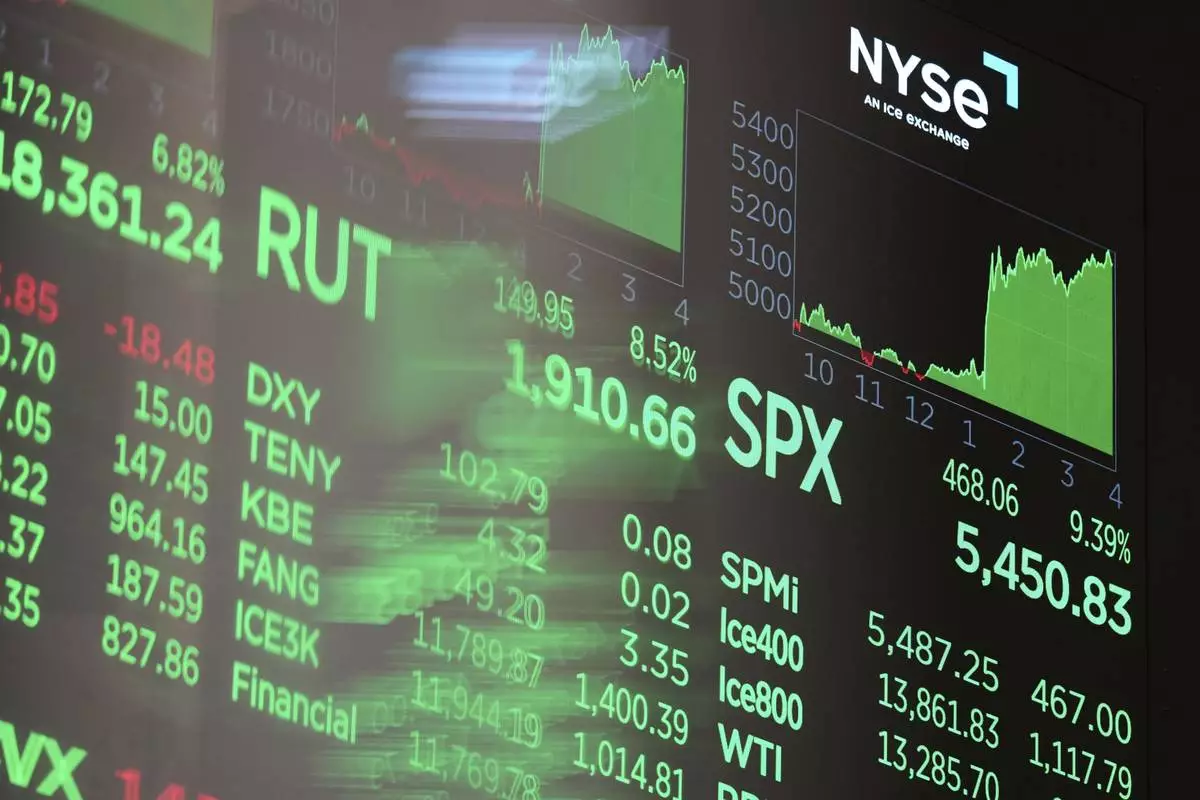
An electronic screen displays financial information on the floor at the New York Stock Exchange in New York, Wednesday, April 9, 2025. (AP Photo/Seth Wenig)
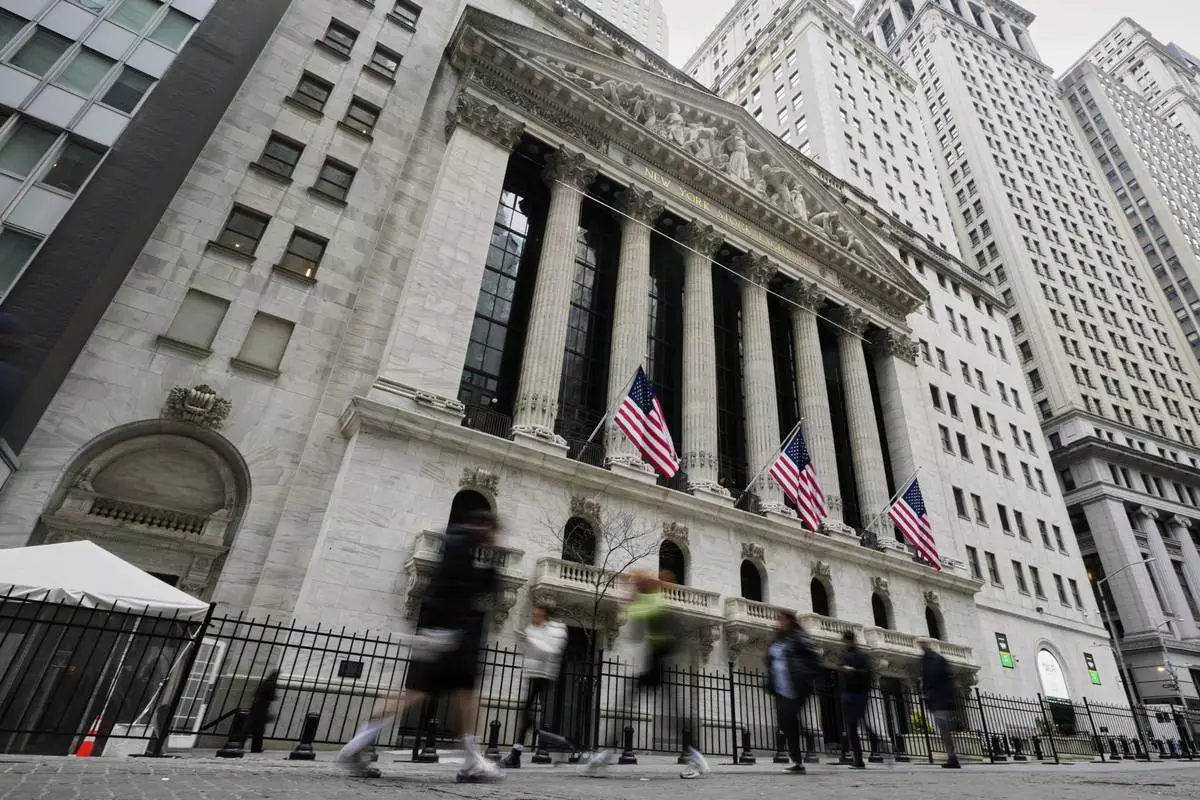
People walk by the New York Stock Exchange, Thursday morning, April 10, 2025. (AP Photo/Richard Drew)
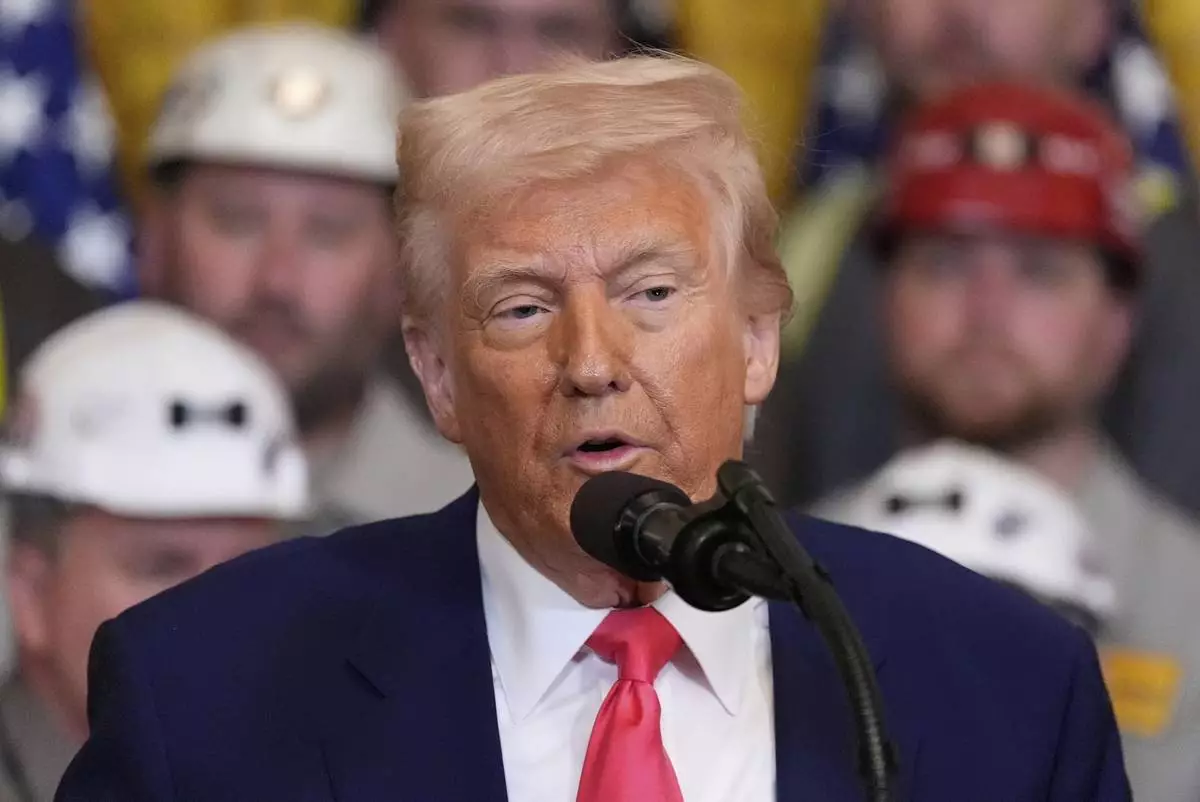
President Donald Trump speaks during an event on energy production in the East Room of the White House, Tuesday, April 8, 2025, in Washington. (AP Photo/Alex Brandon)
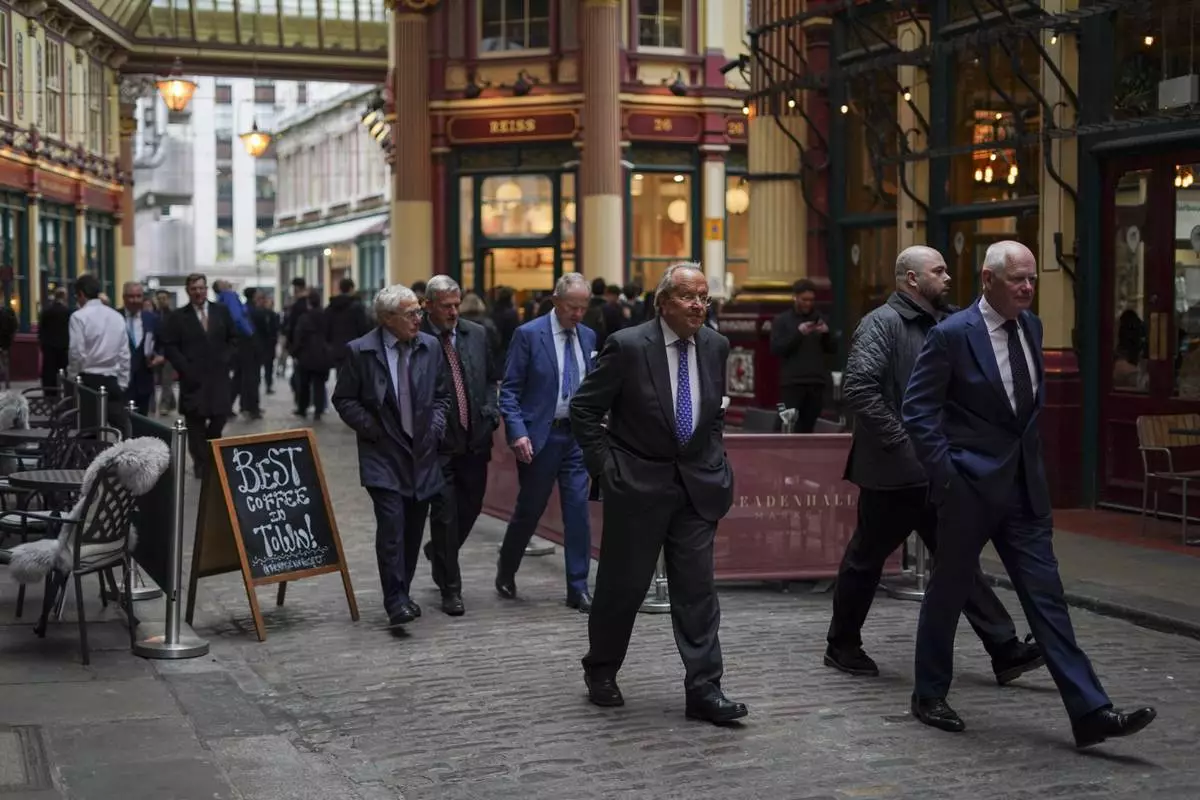
People walk in Leadenhall Market at lunch time, in the financial district, known as The City in London, Wednesday, April 9, 2025. (AP Photo/Alberto Pezzali)
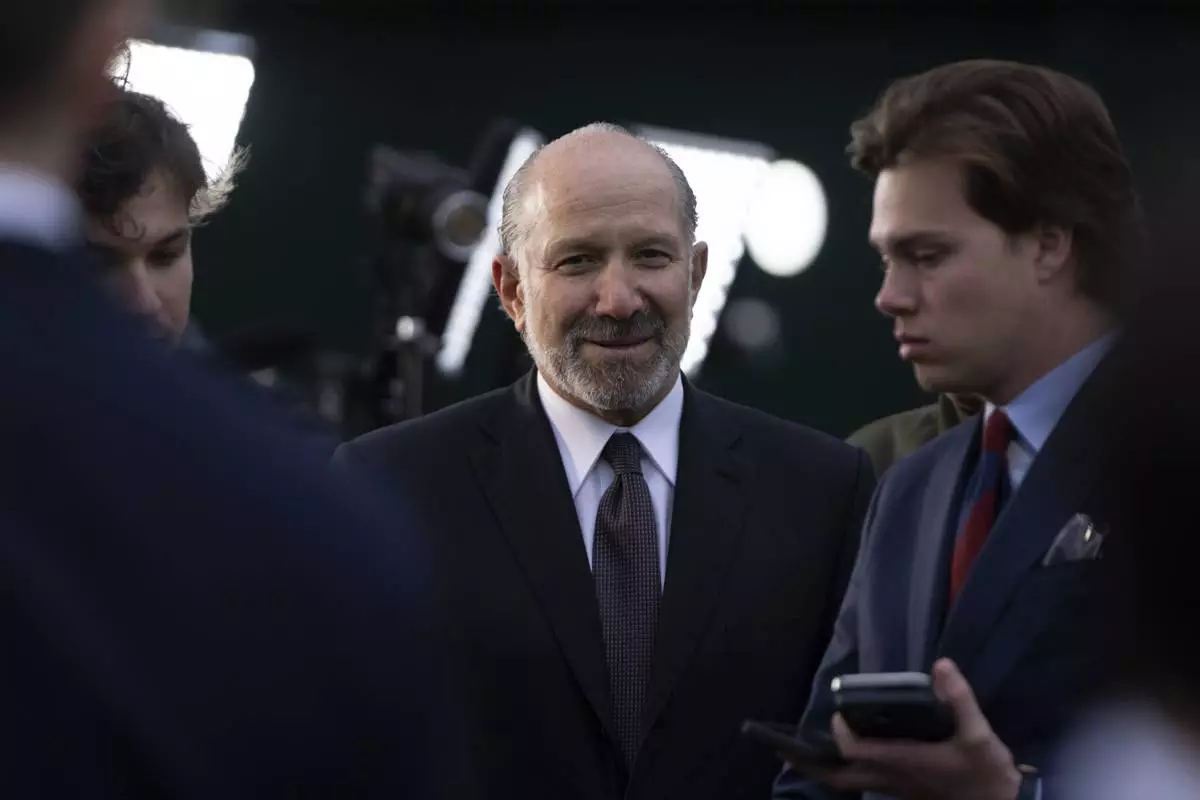
Commerce Secretary Howard Lutnick leaves after doing a television interview outside the White House, Wednesday, April 2, 2025, in Washington. (AP Photo/Mark Schiefelbein)
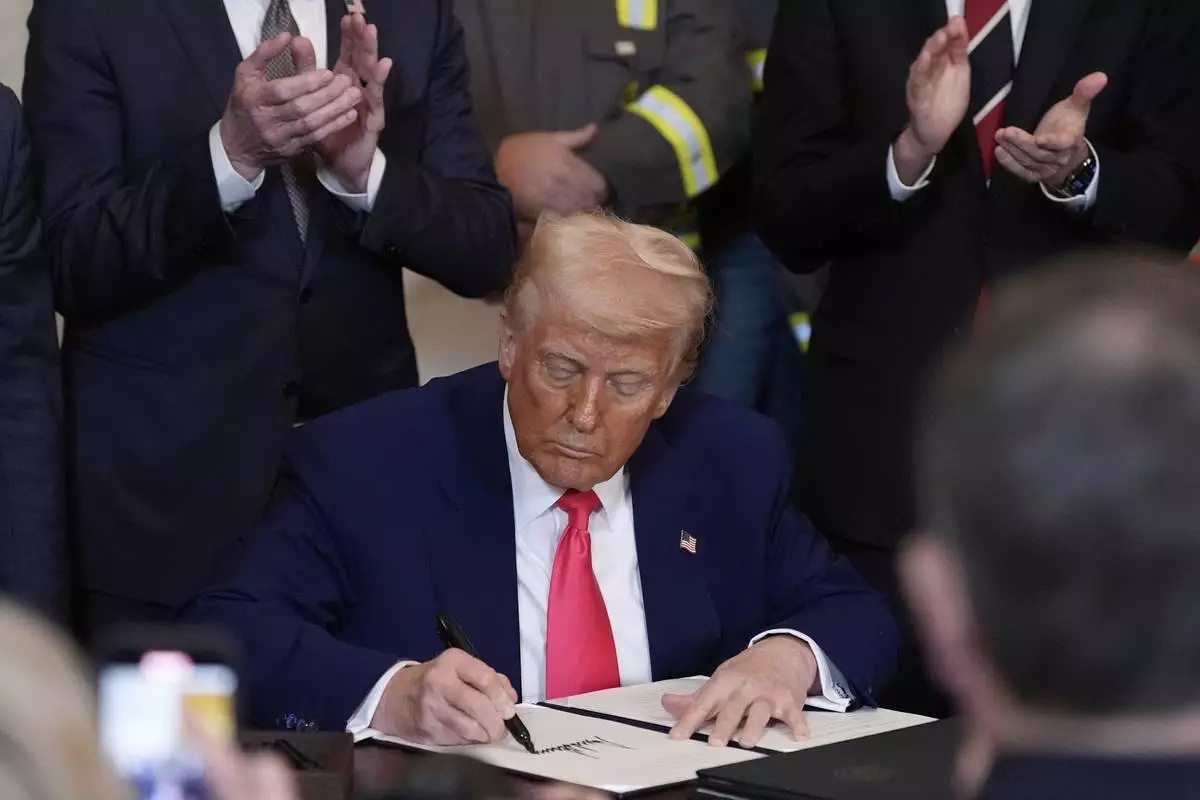
President Donald Trump signs an executive order during an event in the East Room of the White House, Tuesday, April 8, 2025, in Washington. (AP Photo/Alex Brandon)













